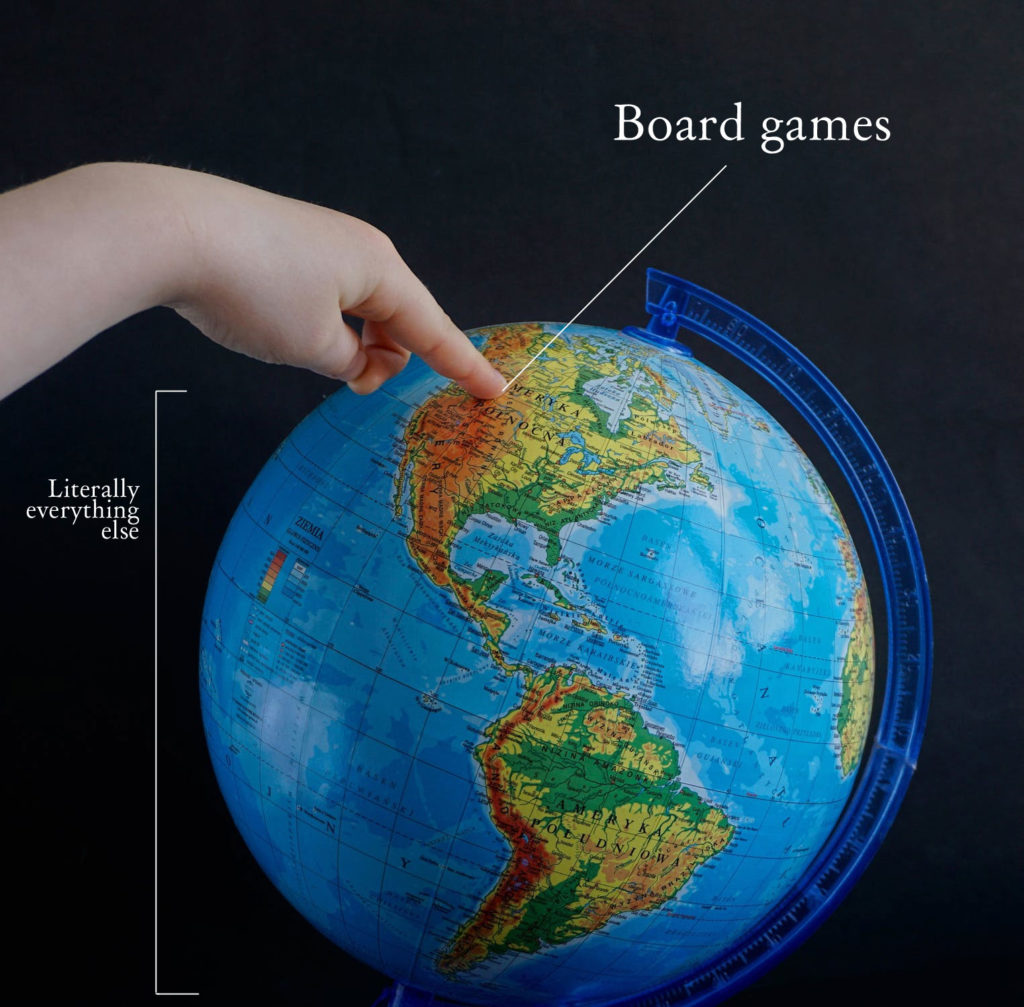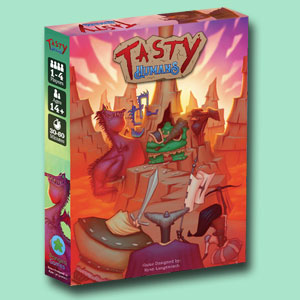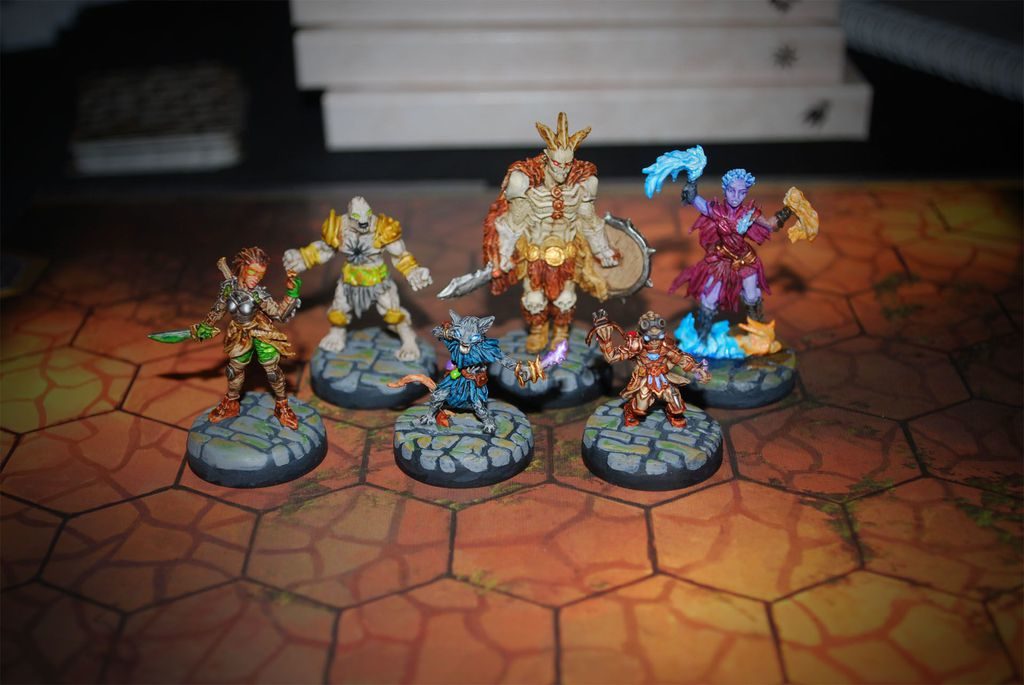Board Games Aren’t Everything: 8 Reasons to Diversify Your Business
Board games aren’t everything. The world is very large and the opportunities to serve others are diverse and abundant.
Looking for more resources to help you on your board game design journey?
Here you go: no email required!
Like this writing style?
Check out my latest blog on marketing here.
I’ve been thinking big-picture lately. Many of you have likely noticed this with my recent posts. In Don’t Just Build a Board Game, Build a Business, I make the argument that you should consider creating something larger than a single game. The recent post, 6 Right and Wrong Reasons to Make a Board Game, is all about why your motivations are important to your long-term well-being beyond simple financial success. Could Kickstarter Become a Board Game Store by 2020 and Board Gaming in 2029 are my attempts to look into a crystal ball and imagine what the board game industry might be like in the near future.
All of this is to say: question your underlying assumptions! I cannot stress this enough. It’s a fool’s errand to do the wrong thing the right way.

Why write about this?
First, a little bit of background. I’m a big believer in Jamey Stegmaier’s Lesson #81: Don’t Quit Your Day Job. During the day, I work as a System Analyst on very complicated software in a big hospital. Additionally, I have begun providing marketing consulting services both inside and outside of the board game industry. I am also working on two tabletop games – Tasty Humans and Rift Shifters: Yesterday’s War. In short, I practice what I preach here.
Before we get to the 8 reasons, let me make a few more points so no one has any false ideas about how this is possible.
- This is only possible through the power of teamwork. Any of these items alone, except for the day job, are not doable by one person’s effort.
- As for the consulting, that did not come out of the blue. After I started regularly receiving cold contacts via this blog, I set up a separate company entirely to handle them. Heck, I’m still working on publishing the site!
- It took me years to get to this point. The years 2015 to 2018 were like standing in front of an automatic butt-kicking machine made to show off the durability of steel-toed boots.
Board Games Aren’t Everything: 8 Reasons to Diversify Your Business
Reason 1: The board game boom may or may not last.
Board game sales have been growing year over year over year for several years. On the surface, this seems like unmitigated great news. After all, jumping into a growing industry is generally a winning move.
The only problem is we don’t know how long this boom will last. People might get tired of board games. Not to mention, they’re a non-essential good. Kickstarter has only been active since 2009, which I will note, is after the financial crises of 2007 and 2008. We’ve been in a bull market for a long time as of the writing of this article. We don’t know what will happen to the modern board game industry when the market isn’t doing so well.
Now, hey, don’t be sad! I personally believe board games have a bright future and that they are popular for a lot of reasons. Failure to acknowledge the inherent uncertainty of a single market is foolish, though.
Reason 2: Board game fundraising models may change.
All that time on social media, I’m seeing people lament that larger companies are pushing smaller ones off of Kickstarter. I’ve even written about the possibility of Kickstarter turning into a store in the near future. Either way, the board game fundraising model is inexorably changing. In the near future, the fundraising model could be such that it forces you to either go through a publisher or become the publisher. Not everybody can or should do that!
Reason 3: Board games have a long time-to-market.
Board games are long haul projects. No matter how fast you try to move, board games take several months to create, and often they take years. It’s hard to stay in a business where it takes that long to start making money and there is no guarantee that the game will succeed. Many, many great board games will flop because they are not right for the market at that moment. The long development cycle makes it hard to cope with this.
However, if you have multiple sources of income, this is a lot more tolerable. As badly as I want Tasty Humans and Yesterday’s War to succeed, Pangea Games / Pangea Marketing Agency has more than one way to survive. I don’t have to live and die by the sword, and neither do my direct reports, contractors, and freelancers.
Reason 4: Board games have tight margins.
If you’ve ever requested quotes from manufacturers, freight forwarders, and fulfillment companies and tallied everything up, you probably cried. You probably cried great money tears. That’s because the margins in the board game industry are tight. It’s really hard to sell a game at $50 or more unless the pieces are top-of-the-line. Similarly, you have to optimize everything at a materials level to make $19.99 or $24.99 games in small print runs.
Having more than one way to make money with a business allows you to create more games until you finally create an evergreen that can be produced in a large print run for a low cost.
Reason 5: Overspecializing in one market leaves you vulnerable to shocks.
This is an extension of what I said in Reason 1. We don’t know how long the board game boom will last. Even if the board game boom does last, there are lots of ways indie creators could be pushed out of the market by uncontrollable factors. New safety regulations regarding toxic materials in ink could force small companies to spend a lot of extra money on safety testing. President Trump could push for tariffs against importing from China, driving up the cost of manufacturing board games by 20% or more. Printer ink could double in price and make board games nearly unprintable. The USPS could raise their arbitrarily low shipping rates and squeeze out the indies so they can finally turn a profit.
Reason 6: If it’s money you’re after, it helps to have multiple income streams.
Money, money, money, money. So many of these points revolve around money. Most people making board games do so because they love making board games, and I think that’s an absolutely fantastic reason. I promote that all day, every day, and I love working with people for whom board gaming is their great passion.
Ah, but you still have to pay the bills. If you want to get that game published, you have to bankroll it, even before you’re ready to raise funds on Kickstarter. If you plan to do that, you either need to be independently wealthy, making a good amount on your day job, or bringing in money on different business pursuits. The first never described me, the second did for a few years, and the third is where I am now with Pangea.
Reason 7: You will build more contacts.
The board game industry is big, but it’s also very small. If you work in different, but related industries – whether through a day job or other business functions – you’ll meet more people. Meeting people whose day-to-day lives are different than your own is one of the greatest ways to learn.
Reason 8: You might find something you like more.
Your motivations are so important. The board game industry runs on passion. After a while, you will find that you either have the passion or you don’t. Diversifying your business will allow you to move toward what you want to do in the long run, whether it’s related to board games or not.
The ability to move toward what you want is crucial. Life is short. It’s too short to spend doing stuff you don’t want to do, at least forever, anyway. “Rise and grind” is fine for a few years, but it makes for an awfully shallow life if you do it for too long. Refuse to let yourself be pigeonholed!
A Caveat: There is a fine line between focus and myopia.
There is one great argument against everything I’ve said. You can argue that it leads to a lack of focus to spread yourself thin across different industries. This, my friend, is true – at least to some extent. The ability to deeply focus is important to doing great work. In fact, this is why I am such an advocate for building a team and having people specialize in what they’re good at and what they enjoy.
Yet the flipside of focus is myopia. You can miss things that are right in front of your face if you spend your days assuming everything must fit into a simple framework. Work hard and with great focus, yes, but also take time to look at the bigger picture.
Final Thoughts
Board games aren’t everything. To focus too much on one way to make money is to miss many paychecks. To focus too much on one way to express yourself is to leave deep thoughts unspoken. Staying within a small community for too long can stop many great relationships from flourishing.
With that, I leave you with one question. What’s a creative or entrepreneurial endeavor you’ve wanted to start outside of board gaming? Let me know in the comments below 🙂






